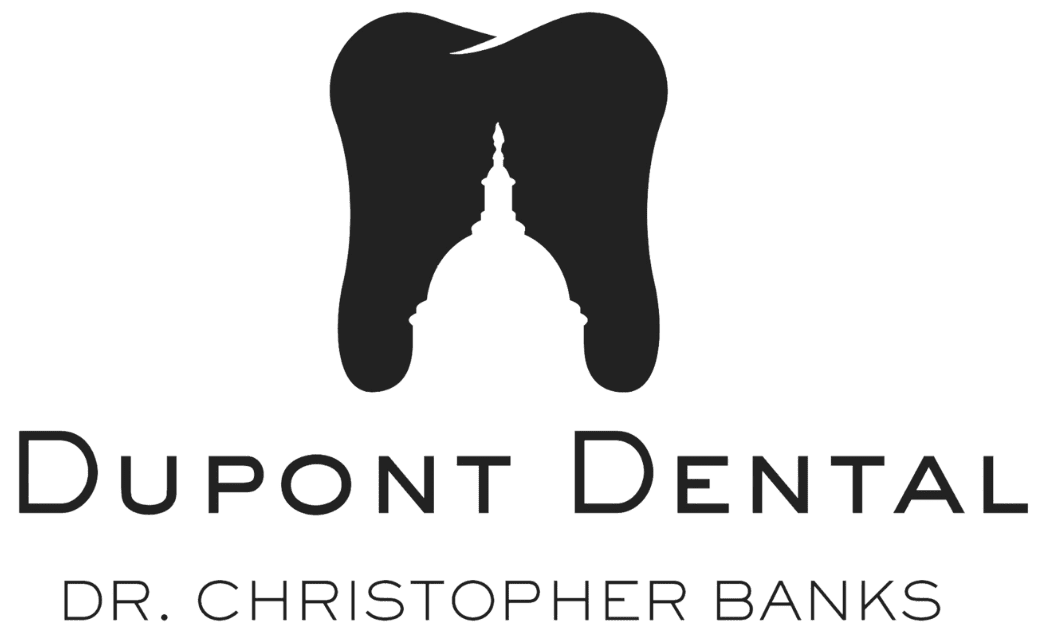Problems like missing teeth, tooth damage, gum disease, and even sleep apnea can make everyday life difficult. At Dupont Dental, we want to help patients renew their smiles’ full function and comfort. We offer restorative dentistry treatments in our Washington, DC, dental office that replace missing permanent teeth, treat gum disease symptoms, fix TMJ pain, and more.
Restorative dental treatments can fully transform patients’ smiles. We also offer comprehensive dental services to the general public in Washington, DC.

Restorative Dentistry in Washington, DC
Our dental office can renew the complete form and function of the smile with restorative dental treatment. These restorative treatments can include:
Dental Bridge
A dental bridge can restore rows of missing teeth. Traditional and cantilever bridges use the support of natural teeth and dental crowns to stay in place. Our office also works with oral surgeons to use dental implants to secure dental bridges.
Implants help patients who do not have enough healthy teeth to support a traditional bridge. The dental implants act like strong roots, providing a secure base for the bridge. This option keeps your bridge in place.
Dental Crown
Tooth crowns are caps that fully cover and protect a tooth. Dental crowns are made of tooth-colored materials that create a result that blends in with natural teeth. We recommend dental crowns for patients with damaged teeth, worn teeth, and large fillings.
We often recommend them for patients with damaged teeth, such as those that have been broken or have large cavities. Crowns help restore the strength and shape of these teeth, allowing you to chew and bite normally again. They can also be used for worn teeth that have lost a lot of their structure due to grinding or decay.
In some cases, crowns are used to protect teeth that have had large fillings. Over time, these fillings can weaken the tooth, making it more prone to breakage. By placing a crown on top, we can provide extra support and prevent further damage.
Dental Implants
Implants are the gold standard for patients who want to replace one or more missing permanent teeth. Dental implants are titanium posts that stabilize restorations like crowns, bridges, and dentures. Once dental implants heal, they permanently stay in the mouth.
With dental implants, you can enjoy the benefits of restored function, such as chewing and speaking normally. They look and feel just like natural teeth, giving you confidence when you smile. Overall, dental implants can be a fantastic choice for anyone looking to replace missing teeth and improve their quality of life.
Dentures and Partials
Full and partial dentures are restorations that replace rows or arches of missing teeth. While dentures traditionally lay on the gums, we recommend implants to secure dentures and help patients improve their bite function. When dentures are attached to implants, they stay firmly in place, which can help you bite and chew more effectively. This means you can enjoy a wider variety of foods. You don’t have to worry about your dentures slipping or becoming uncomfortable.
Gum Disease Treatment
We offer deep-cleaning treatments for patients with gum disease. These treatments remove plaque and tartar buildup that irritate and inflame the gum tissue. Regular deep gum cleanings can keep chronic gum problems at bay. For information on gum disease treatment options, please visit Periodontal disease treatment.
Sleep Apnea
Patients with sleep apnea experience pauses in breathing due to an obstructed airway. While CPAP machines are the traditional treatments for sleep apnea, oral appliances offer a more comfortable and portable option. Dr. Banks can create custom-made oral appliances to keep the airway open. This option is great for patients with mild to moderate sleep apnea.
TMJ Treatment
Temporomandibular joint disorders (TMD) are bite disorders that create pain and facial and jaw dysfunction. Many patients with TMD have jaw pain, tooth wear, and headaches.
TMJ treatment includes physical therapy, a soft diet, and nightguards. We can develop custom-made nightguards for TMJ patients who experience teeth clenching and grinding, jaw pain, and tooth wear.
Restorative Dental FAQs
Discover more about restorative dentistry in Washington, DC, with answers to these common patient questions:
How do I know if I need restorative dentistry?
You may need restorative treatment for multiple reasons. First, if you have constant or sharp pain in your teeth, it could mean you have a cavity or damage that needs to be treated. Tooth sensitivity, and red, swollen, or bleeding gums can indicate gum disease. Also, look for any cracks, chips, or breaks in your teeth. If you see any damage, it’s a good idea to get it checked out.
Can restorative dentistry improve my smile?
Yes, restorative dentistry can definitely improve your smile. If you have chipped, cracked, or broken teeth, restorative treatments like dental crowns or bonding can fix them. This makes your teeth look whole and healthy again. If you have missing teeth, restorative options like bridges, dentures, or dental implants can fill the gaps. This not only improves your smile but also helps you chew and speak better.
Are cosmetic dentistry and restorative dentistry the same?
Cosmetic dentistry focuses on improving the appearance of your smile. Restorative dentistry fixes dental problems and restores the function of your teeth. It helps to repair damaged teeth or replace missing ones. Some treatments can serve both purposes. For example, dental crowns can restore a damaged tooth and also make teeth look better.
What is a complete mouth restoration?
A complete mouth restoration or a full mouth reconstruction uses multiple restorative treatments to renew the smile. Dr. Banks works with patients to help them restore their smiles with the latest techniques and technologies. He also works with local surgeons and specialists to provide treatments like dental implants.
How long do dental implants last?
Dental implant posts are permanent. This is because oral surgeons place them in the jaw bone, where they fuse with the tissue over three to six months. Once implants are fully healed, they become a permanent part of the smile. Implants can also ensure that restorations last longer than removable counterparts.
How long do dental crowns last?
Dental crowns can last a long time, usually between 10 to 15 years or even longer with proper care. The lifespan of a crown depends on the materials. Crowns can be made from different materials, like porcelain, metal, or a mix of both. We provide porcelain crowns that match natural teeth.
If you grind your teeth at night, it can put extra pressure on your crown, causing it to wear out faster. If you have this habit, your dentist might suggest a nightguard.
Do I have gum disease if my gums bleed?
Bleeding gums are common among patients with gingivitis or gum inflammation. Patients who experience bleeding gums after brushing their teeth can eventually develop gum disease if they stop caring for their smiles.
While bleeding gums are a sign of gum disease, they are reversible. Flossing, brushing, and visiting the dentist regularly can help reverse gingivitis. Patients with gum disease symptoms like swollen, irritated, and receding gums will require more thorough dental care.
Does insurance cover restorative dental treatments?
Many dental insurance plans cover restorative dental treatments, but the amount of coverage can vary. Most insurance plans typically cover basic restorative treatments like fillings and crowns. Some plans also cover bridges and dentures. However, coverage for dental implants might be limited or not included.
Dental insurance usually covers a percentage of the costs. Insurance plans can also have an annual limit on how much they will pay for dental care in a year. Once you reach this limit, you must pay for any additional treatments out of pocket.
Some insurance companies require pre-authorization for certain treatments. This means your dentist must submit a request to the insurance company before starting the treatment to see if it will be covered.
Check with your insurance provider to understand what is covered and how much you will need to pay. Your dentist’s office can also help you understand your benefits and file claims.
Renew Your Smile
Do you need restorative dentistry treatments in Washington, DC to address one or more dental problems? You can schedule an appointment with Dr. Banks online or call Dupont Dental at (202) 946-4720.
